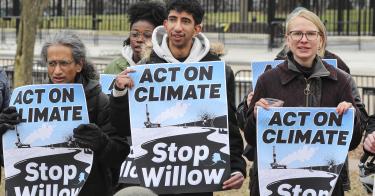President Biden’s decision to approve ConocoPhillips’s $8 billion Willow project in Alaska is a welcome one, but it’s the exception that proves the rule, unfortunately: It came a day after he restricted development in more than half of the Arctic National Petroleum Reserve and banned future oil and gas leasing in federal waters in the Beaufort Sea.
Biden’s Arctic Ocean ban is Russia’s gain. It removes 2.8 million acres from leasing, until another administration or Congress decided otherwise.
Just as Biden’s focus on energy made from wind, solar, and battery power is a boon to China, the main producer of these renewable components, forbidding exploration in the Arctic gives Russia an advantage in those frozen waters, filled with valuable minerals.
If Biden had permitted oil and natural gas leasing in the Arctic Ocean, but not approved the Willow project, America would have been able to counter Russia for a valuable disputed resource. By siding with the environmental lobby in the Arctic, Biden is weakening America.
>>> When Energy Markets and Geopolitics Collide
On Tuesday Russia repaid Biden’s favor by forcing down an American drone.
Biden’s actions mirror the split in the Democratic Party between the Blues and the Greens. Blue-collar workers have jobs that thrive on affordable energy and who want lower electricity bills. Green environmentalists say they want to eliminate fossil fuels and move to net-zero fossil fuel production in 2050.
In another concession to the Greens, Biden on Tuesday reneged on the Federal government’s promise to build a road connecting King Cove natives to an airport in Cold Bay, calling for further environmental review.
Fifty years ago, the Democratic Party represented both the Blues and the Greens. But the difference grew in the 21st century, and now many blue-collar workers, especially those based in rural areas, trend Republican. They realize that refusing to use America’s resources deprives them of jobs, affordable energy, and upward mobility.
The Willow project could result in the production of 600 million barrels of crude oil over the next 30 years, generating 2,500 jobs for the Blues and $17 billion in tax revenue to help Greens with pet projects. Not only will it improve American energy independence, but it will give America the ability to influence global politics through judicious use of exports.
ConocoPhillips chairman and chief executive officer Ryan Lance, also trying to thread a needle between the Blues and the Greens, said, “Willow fits within the Biden Administration’s priorities on environmental and social justice, facilitating the energy transition and enhancing our energy security, all while creating good union jobs and providing benefits to Alaska Native communities.”
The Greens oppose Willow on the grounds that oil production will generate carbon. Ben Jealous, executive director of the Sierra Club, said, “This project has the potential to entirely undo the clean energy progress we’ve made, lock us into fossil fuel drilling for another 30 years, and threaten the communities and wildlife who rely on these Alaskan landscapes.”
>>> 9 Policy Objectives to Unleash Domestic Oil Production and Help Drive Down Gas Prices
Never mind that producing wind turbines and solar panels can only be accomplished with fossil fuels. In fact, the use of renewables locks us into fossil fuels. The largest wind turbine and solar manufacturing plants are in China, and use coal-fired power, which also generates carbon. So does buying oil from Saudi Arabia and Venezuela, as Biden has proposed.
America, as the world’s largest oil and gas producer, has the ability to affect the price of oil. A dramatic transformation in energy production has taken place between 2008, when the United States was producing 5 million barrels per day, and 2022, when production reached over 11 million barrels per day.
In 2008, America had net imports of around 11 million barrels per day. Now, America is a net exporter, selling almost 6 million barrels per day. Associated natural gas production substituted for coal and reduced emissions, allowing the United States to achieve emissions targets without costly and intrusive regulation.
Producing more oil and gas would allow America to lower prices at home, generate economic growth with more jobs for blue-collar workers, and have more oil to export to Europe and Asia.
In addition to ConocoPhillips’s Willow project, America needs to offset Russia’s and China’s influences and expand leadership in energy production by exploring the Arctic. Let’s hope that a new administration will have the strength to do that.
This piece originally appeared in the Daily Caller



